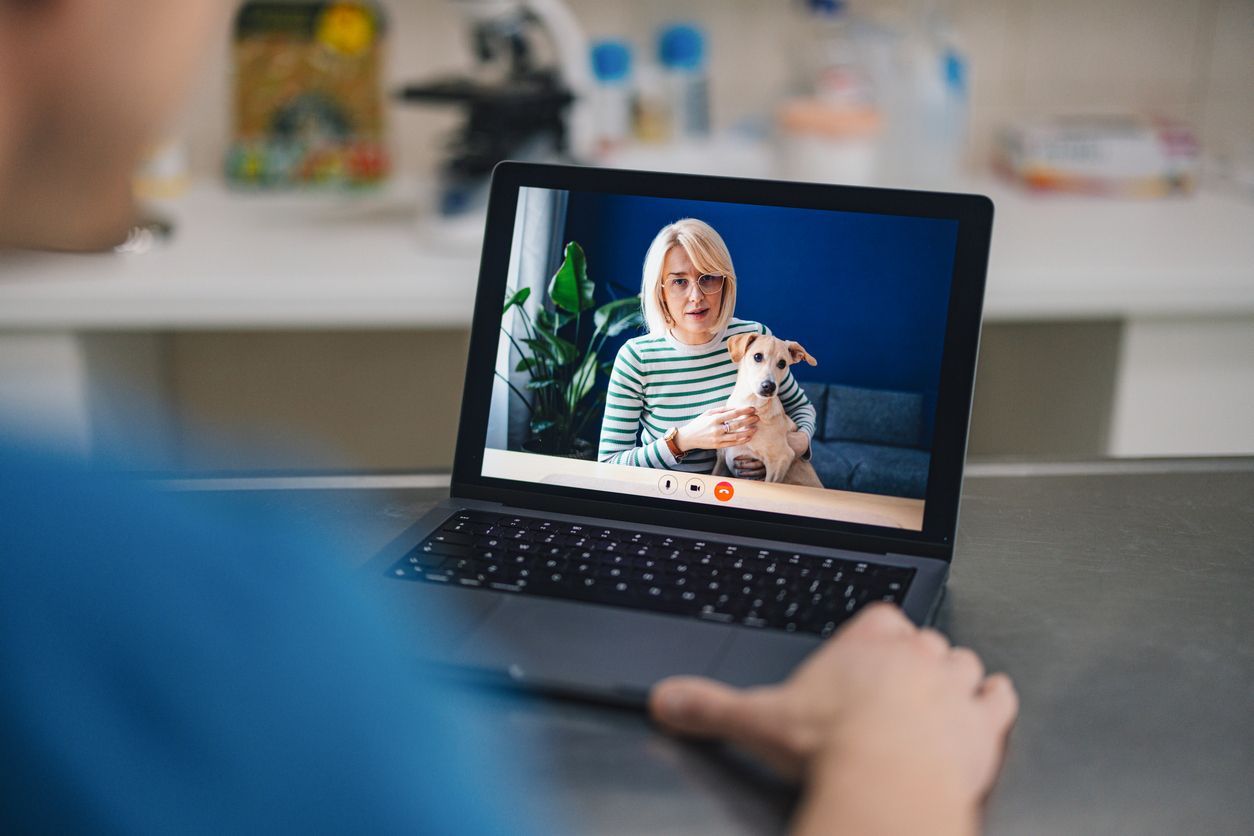How to detect and treat eye infections in puppies

Disclaimer: This article, its content, and its related references do not constitute veterinary advice and should not be considered a substitute for veterinary care. If your pet is showing any symptoms that could indicate a medical emergency, please seek immediate emergency care.
Eye infections are very common in dogs, including puppies. In puppies, symptoms of eye infection are often due to a viral infection affecting the upper respiratory system. It’s important to be able to recognize symptoms and to seek help when there are changes to your puppy’s eye health. Read on to learn:
- Types of eye infections
- Common eye infection symptoms
- How puppies develop eye infections
- Veterinary treatment of puppy eye infections
Viral, parasitic, fungal, and bacterial infections can affect all parts of the eye, and the eye can become infected after an injury, such as a foreign body in the eye or a scratch. Treatment for eye infections in puppies varies depending on the underlying cause; some will go away on their own. When the eyes require treatment, eye drops, oral medications, and nursing care are commonly recommended. Since there are other conditions that can look like an eye infection, it’s important to talk to a veterinarian any time a puppy has eye symptoms or other signs of illness for a proper diagnosis and for effective treatment.
What is an eye infection?
An eye infection results when an infectious agent enters and becomes established in a part of the eye. Eye infections in puppies are usually viral or bacterial but can also be caused by parasites or a fungus. Different parts of the eye can become infected, resulting in inflammation.
- Eyelid (blepharitis)
- Conjunctiva (conjunctivitis)
- Cornea (keratitis)
- Structures within the eye (uveitis)
Puppy eye infections can be primary or secondary. A primary infection develops directly in the eye, while a secondary infection occurs when some other health issue leads to the eye infection. Common causes of secondary eye infections in puppies include:
Puppy eye infections are very common and have a wide variety of potential causes, symptoms, and treatment options.
Signs of eye infections in puppies
Common symptoms of eye infections in puppies include:
- Eye redness or bloodshot eyes
- Eye discharge or excessive tears
- Red or swollen tissue around the eyeball
- Squinting or excessive blinking
- Pawing at the eyes
- Red or swollen eyelids
- Eyes swollen shut
Not all puppies will have every possible symptom, and clinical signs can vary in severity. Eye infections may affect one or both eyes. Other eye conditions that aren’t infections can have similar clinical signs, so it’s important to get an accurate diagnosis from a veterinarian.
Pet eye infections often occur as a result of another underlying medical condition that may have additional symptoms, such as:
Additional clinical signs can vary depending on the underlying cause of the infection.
Causes of eye infections in puppies and how they’re diagnosed
Eye infections are caused by infectious agents entering and reproducing in the eye, leading to inflammation. Bacterial, viral, fungal, and parasitic pathogens may cause a primary infection of any tissue in or around the eye. However, eye infections in puppies are more commonly associated with other systemic illnesses, such as:
- Adenovirus (infectious canine hepatitis)
- Bordetella (kennel cough)
- Canine distemper virus
- Leptospirosis
- Lyme disease
Adenovirus is an especially common cause of puppy eye infections.
Ocular larva migrans, a rare condition in which roundworms migrate through eye tissue, can also occur in puppies.
Secondary infections can be caused by injuries to the eye from scratches or foreign matter in the eye. This includes eyelash and eyelid abnormalities where the eye is constantly irritated by abnormal eyelashes rubbing against it or drying out if the lid rolls back. Allergies and other eye diseases, like dry eye, a condition that affects tear production, can also put the eye at risk for secondary infection.
Veterinarians use an eye exam and diagnostic testing to determine if an eye is infected or if a different issue is causing the symptoms. The diagnostic process may involve:
- Thorough physical and eye examination
- Fluorescein eye stain to look for scratches and ulcers
- Bloodwork, including testing for infectious diseases
- Bacterial or fungal culture
- Cytology
- Biopsy
A definitive diagnosis is necessary to determine an effective treatment plan. However, it isn’t always necessary to determine exactly which pathogen is causing the infection. Many puppies improve with symptomatic care and time.
Puppy eye infection treatment options
The best way to treat an eye infection depends on what’s causing it. Bacterial, viral, parasitic, and fungal eye infections are all treated differently. Not all infections require medical treatment; puppies may recover from a viral infection on their own or with symptomatic care. When indicated, treatment may include:
- Eye medications, such as antibiotics, antifungals, or anti-inflammatories
- Oral medications, such as antibiotics, anti-inflammatories, or pain management
- Home nursing care
Home nursing care may involve gently applying a warm compress and cleaning discharge from the face. It’s best to remove discharge before it hardens and accumulates on the fur, as this can irritate the skin underneath.
Many puppy eye infections are caused by upper respiratory infections that may require additional treatment. Secondary infections are likely to recur if the underlying issue isn’t addressed properly. Additional treatment may include:
- Allergy medication
- Surgery for eyelid or eyelash disorders
Do not attempt to treat your puppy’s eye issue at home without talking to a veterinarian. Misdiagnosis is likely, and the underlying problem may not be identified or addressed. Improper home treatment delays appropriate treatment from a vet and may cause additional damage to the eyes. An online vet can offer guidance if you’re having trouble giving topical eye medication at home.
When to see a vet for your puppy’s eye health
It’s important to talk to a vet any time you notice changes in your puppy’s health, including the appearance of any eye symptoms. “Puppies don’t have fully developed immune systems and may not have completed their vaccination series, so they’re at risk for upper respiratory tract infections that commonly cause eye infections,” explains Dr. Jo Myers, a veterinarian on Vetster. Some infections can heal on their own, but other untreated eye infections can lead to permanent eye damage and loss of vision. If your puppy is having eye symptoms, a virtual vet appointment is an excellent way to ask a vet for advice.
Are eye infections in puppies emergencies?
While eye infections are often not emergencies, it’s important to seek prompt veterinary care any time a puppy has eye symptoms. Many eye symptoms are common signs of infectious diseases that can be dangerous for puppies. Do not attempt to treat your puppy’s eyes without a veterinarian’s help. While waiting for a veterinary appointment, you can help ease your puppy’s symptoms by using a warm compress to gently remove eye discharge from their face before it dries.
FAQ - How to detect and treat eye infections in puppies
How do you treat a puppy’s eye infection?
Treatment options vary depending on the type of eye infection. Viral, fungal, parasitic, and bacterial eye infections require different kinds of treatment. It’s important to get a proper diagnosis from a vet so your puppy can receive effective treatment. In addition, the same symptoms that occur with an eye infection can also occur with other medical conditions that need different forms of treatment.
Can I give my puppy human eye drops?
Do not put anything in your puppy’s eye that has not been recommended by a veterinarian. Human eye drops may not be the right form of treatment, and they may contain ingredients that can irritate a puppy’s eyes. While waiting for a vet appointment, you may help at home by gently applying a warm compress to the eye and cleaning eye discharge from the face so it doesn’t build up, dry out, and become hard to remove.
Can a dog’s eye infection heal on its own?
Some eye infections in dogs can heal on their own or with minimal supportive care. However, other infections require veterinary treatment and can lead to permanent eye damage or vision loss. In addition, many infections are caused by other health conditions that require veterinary treatment.










